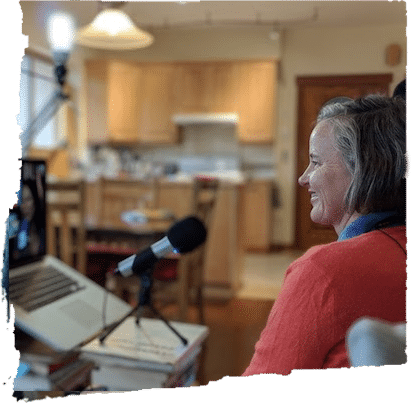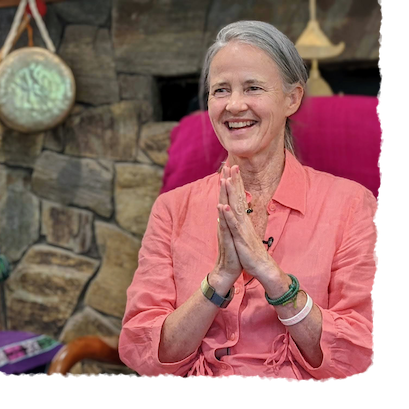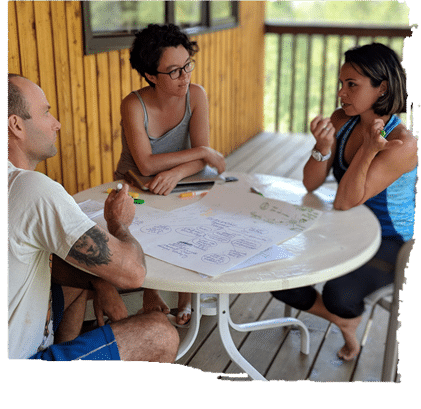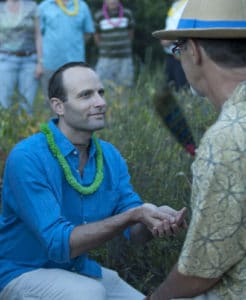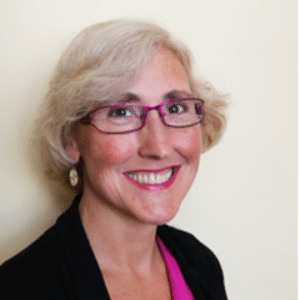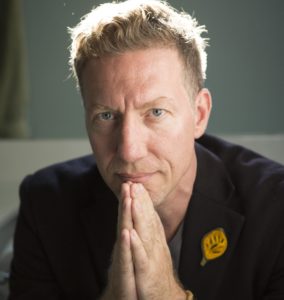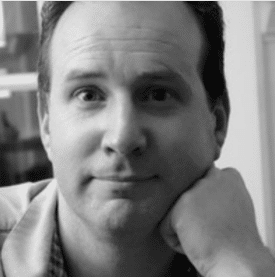
A Global Dharma Training Community
Greetings! We wish to welcome you to an authentic, living lineage of spiritual teachings – led by Qapel (Doug Duncan) and Sensei (Catherine Pawasarat). Our roots are primarily based in the Vajrayana buddhadharma teachings, but also include Western Mystery teachings and modern therapeutic approaches to spiritual awakening and liberation.
We are a global, modern teaching, taking the teachings of liberation forward into the 21st century.
Spiritual Roots
The Namgyal Lineage
Where are these teachings coming from? Our root guru was the Venerable Namgyal Rinpoche, recognised as a Karma Kagyu lineage master. Prior to being recognised and enthroned as Namgyal Rinpoche, he was first ordained by Ven. Sayadaw U Thila Wunta in Burma, where he trained for many years, and given the name Ananda Bodhi.
Teacher Bios
Qapel (Doug Duncan) & Sensei (Catherine Pawasarat)
Qapel (Achariya Doug Duncan) and Sensei (Catherine Pawasarat) were Planet Dharma’s founding teachers. Since Qapel passed away in 2024, Catherine Sensei is our head teacher and lineage holder. Qapel and Sensei also founded Clear Sky Meditation Centre in BC, Canada.
Awakening Today
What do our teachings & path look like?
We offer an ever evolving path for committed, courageous, modern seekers.
The Buddha held up a simple flower as metaphor of the profound nature of things as they are: so uncomplicated, so immediate, and so very difficult to explain. Yet, to get us to that realization, most of us need a path and disciplined training for the mind, body and spirit.
What does spiritual training look like for us today, as modern people?
Upcoming Events, Retreats & Courses
Awakening Today
Spiritual Training for Modern People
This is not a teaching for everyone. This is a particular lineage for determined students who want to unfold quickly and deeply. Whatever compassionate methods helps beings suffer less, we might use, and they might not adhere to political correctness. It makes for a fresh and real revolution in one’s being. We have laid out our teaching methodology below, via four pillars and five principles.
Four Pillars
of Spiritual Training
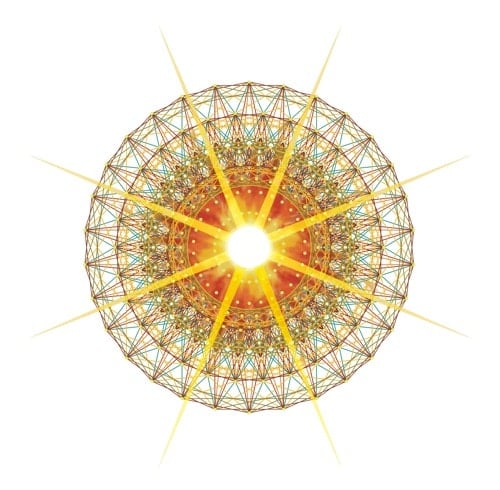
Meditation
Meditation is a powerful tool by which we reach bliss, clarity and then wisdom. By applying concentration to an object (such as the breath or a mantra and visualisation), we develop calm and increase bliss. Building on this, we meditate to increase insight into the true nature of phenomena and our minds.
Show More
While we value and sometimes work many types of meditation from different traditions, in our experience the Buddhist meditation system is exemplary in its detailed mapping of consciousness.
So in terms of the actual practices with give our students, 70% of our foundational practices are from the Buddhist vajrayana tradition – primarily the karma kagyu lineage. Called Ngöndro, in Tibetan, these practices purify the emotions (Vajrasattva), release the trauma in the body (Prostrations) and open the mind to compassion (Chenrezig). Many of the retreats we offer also draw from Theravadin, Mahayana and Zen Buddhist teachings.
As well, we use Western psycho-analytical therapies such as Family Mandala work and cognitive behavioural approaches. Other important methodologies include the Western Mystical meditations and tools, including Holistic Clearing, womb karma work, star group meditations, the hero’s journey, astrological and tarot archetype studies.
We encourage our committed students to do at least two weeks of solitary or focused meditation retreat work each year, a month every three years and three months retreat every five years. And, we expect that our students work diligently at the foundational practices which involve prostrations (or a variation thereof), mantra, visualisation and insight meditation.
Learning
By engaging our minds, asking better questions and exposing ourselves to different ideas and concepts, we grow. A spiritual path of learning includes discovery, exploration and study. It incorporates both formal study and apprenticeship-style modalities.
Show More
In addition to Buddhist and Western philosophy, we use psychology, science, the arts, kinesthetics, conscious business and other kinds of direct experience to develop and integrate our various interests.
We encourage our committed students to participate in our three or four main online study courses throughout the year – each is usually a full weekend or a four week program on a wide variety of topics.
Traveling on Dharma Trips with the Teachers and community is another great way to learn.
Personalised study may also be given by the Teachers to each student based on unique needs and proclivities.
Karma Yoga
As a form of ‘meditation in action’, karma yoga helps us be of service while we contact calm and concentration. By establishing attention on the activity in front of us, rather than on our personal issues and difficulties, we learn how to work with others unhindered by our own conflicting states or those of others.
Show More
In Karma Yoga, we watch the patterns that arise as we interact with others. We use the same principles that we’ve learned in meditation and apply it to our work, our relationships and our communities. When we use activity and work as objects of meditation, we’re able to see to the spacious clear sky mind state … even amidst the distractions of interpersonal conflicts, goals or obligations at work, family emergencies, stock market dips and dirty dishes.
As you may have gathered from your own experience, it’s far more challenging to practice with others and while being active, than by oneself on a meditation cushion. This is because interactions bring as many sets of potentially conflicting emotions and self-limiting views as there are people involved. Since they all arise, each must be identified and worked through.
However, the good news is that the path of Karma Yoga empowers people to move past their limiting views together and simultaneously. This means we become better at communicating with each other, with our communities, and ultimately become more effective as positive forces in the world. This is something to celebrate!
Long term students are encouraged to participate in karma yoga with their local dharma communities, the Teachers, or their retreat center. And, to see all their work, livelihood, career, family and other activities as a form of ‘meditation in action.
Links:
- 3 Month Karma Yoga Program at Clear Sky
- Hybrid Stay for existing students: Contact us.
- Virtual Karma Yoga Program: Contact us.
Shadow Integration
The ‘shadow’ is the aspects of our psyches that we have pushed into the dark and ignored. How we act and feel about power, money and sex are three examples. In essence ‘shadow work’ addresses the lower three chakras, providing a solid foundation on top of which the higher chakras can flower.
Show More
Three areas that tend to get pushed into the shadow are money (survival), sex (identity) and power (control over our lives). These can be very strong unconscious forces at work in our lives that influence our personalities.
Money, sex, and power are juicy areas of exploration for all of us, fraught as they can be with conditioned emotional baggage and ego insecurities, and often with hidden unconscious views.
It’s incumbent upon all of us who seek transformational change, greater awareness, and spiritual awakening to investigate these foundational realms of human experience with valor, intellectual rigor, and emotional integrity.
Read more about how we work with this: Important Advisory on Money, Sex and Power.
Five Principles
Spiritual Training for Modern People
We’ve talked about the ‘what’ of the spiritual path in the four pillars. But how do you do the work with Teachers and community? What attitude should one take? How do you bring your practice into every moment of every day? We’ve summed this up with five principles.
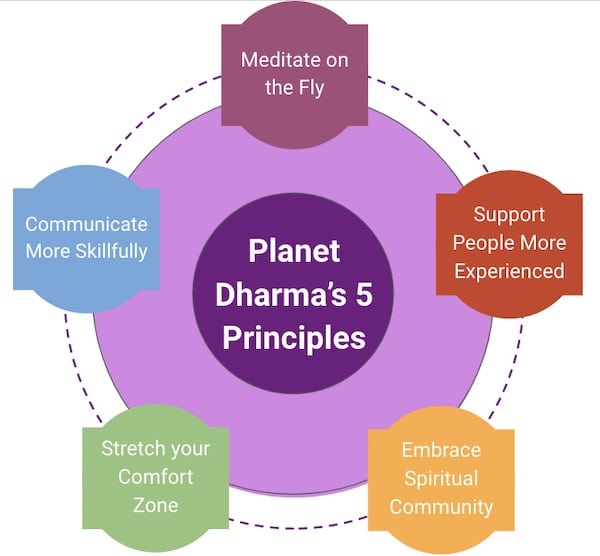
Learn More
Five Principles
Here are our five principles for the ‘how’ of spiritual practice:
- Meditating on the fly, bringing your awareness everywhere.
- You learn, over time how to communicate more skillfully while also acknowledging and humbling yourself to the fact that you might not have as much experience as others on the path – so
- Honouring the wisdom of others with more experience, as we would if we were studying anything professionally.
- You have to want to stretch your comfort zone, to get uncomfortable, and to do that with others, and
- Really embracing community and not running away when it starts to heat up. That’s where breakthrough and liberation lie.
Conscious Community
Evolving Group Guru
We recognize that we are at a time of great transition, moving from the piscean age’s traditional model of ‘One Guru’ (one Pope etc) to the more collective ‘Group Guru’ of the Aquarian age.
While valuing the important relationship between Teacher and Student in liberation, we recognize that as the world is ever more complex, and it will be communities in the future that carry human society’s wisdom potential forward.
Qapel and Catherine Sensei are primary Teachers to many students, and are supported by their senior students who also act as teachers in the community.




